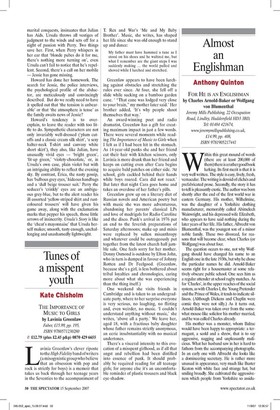Tunes of a misspent youth
Kate Chisholm THE IMPORTANCE OF MUSIC TO GIRLS by Lavinia Greenlaw Faber, £15.99, pp. 195, ISBN 9780571230280 £12.79 (plus £2.45 p&p) 0870 429 6655 Lavinia Greenlaw's clever riposte to the High Fidelity band of writers (a misogynistic group who believe that an obsession with pop and rock is strictly for boys) is a memoir that takes us back through her teenage years in the Seventies to the accompaniment of T. Rex and War's 'Me and My Baby Brother'. Music, she writes, has shaped her life since she was old enough to stand up and dance: My father must have hummed a tune as I stood on his shoes and he waltzed me, but what I remember are the giant steps I was suddenly making ... the world pulled and shoved while I lurched and stretched.
Greenlaw appears to have been lurching against obstacles and stretching the rules ever since. At four, she fell off a slide while sucking on a bamboo garden cane. "That cane was lodged very close to your brain," my mother later said.' Her brother added, 'It's why people shoot themselves that way.'
An award-winning poet and radio dramatist, Greenlaw has a gift for creating maximum impact in just a few words. There were several moments while reading The Importance of Music to Girls when I felt as if I had been hit in the stomach. As 14-year-old punks she and her friend cut their hair with kitchen scissors, only Lavinia is more drunk than her friend and keeps on cutting even after Cara begins to acquire bald patches on either side. 'At school, girls cackled behind their hands while boys roared. Cara did not react.' But later that night Cara goes home and takes an overdose of her father's pills.
Greenlaw grew up on a literary diet of Russian novels and American poetry but with music she was more adventurous, abandoning her parents' classical LPs and love of madrigals for Radio Caroline and the disco. Punk's arrival in 1976 put an end to the feverish preparations of Saturday afternoons; make-up and minis were replaced by sullen misanthropy and whatever could be outrageously put together from the latest church hall jumble sale. One feels sorry for her mother. Donny Osmond is outdone by Elton John, who in turn is dumped in favour of Johnny Rotten and Dr Feelgood. (Greenlaw, because she's a girl, is less bothered about tribal loyalties and chronologies, caring more about what she was experiencing than the thing itself.) One weekend she visits friends in Cambridge and is taken to an undergraduate party, where to her surprise everyone is very serious, no laughing, no flirting and, even weirder, no music. 'I couldn't understand anything without music,' she writes, 'above all a party.' We leave her, aged 18, with a fractious baby daughter whose father remains strictly anonymous, an eerie insubstantiality with no musical undertones.
There's a visceral intensity to this evocation of a misspent girlhood, as if all that angst and rebellion had been distilled into essence of punk. It should probably be required reading for all teenage girls; for anyone else it's an uncomfortable reminder of plastic trousers and black eye-shadow.

























































 Previous page
Previous page